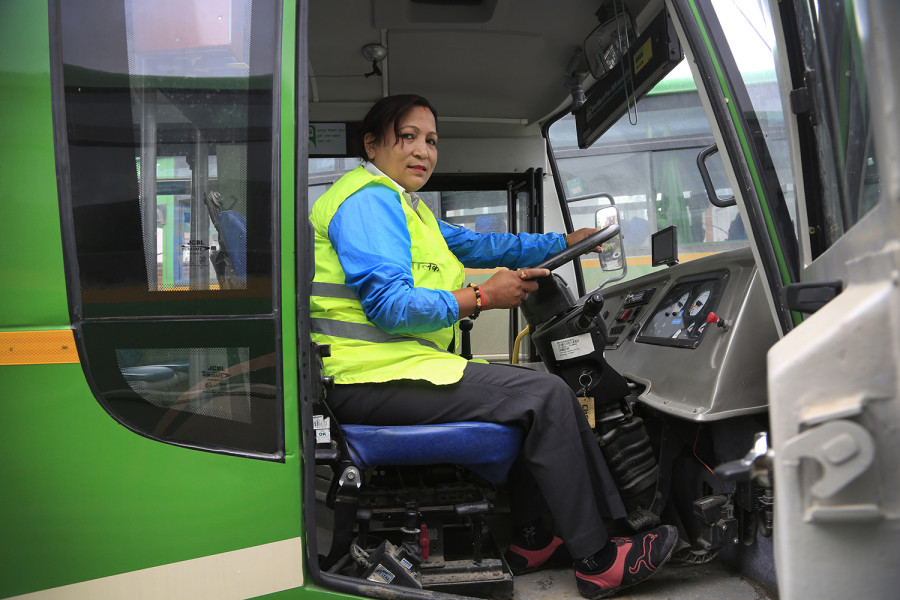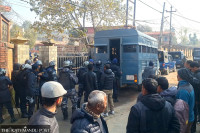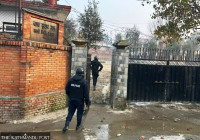Valley
A day in the life of Sajha Yatayat's only female driver
Many appreciate Harmita Shrestha’s work, calling it a step ahead for women empowerment, but the days aren’t always that easy in a man's world, she says.
Anup Ojha
Just like every morning, on a drizzling Tuesday, Harmita Shrestha rolls out her bus at 9:30 am from the Sajha Yatayat garage in Hariharbhawan.
A little down the road, at the Pulchowk Engineering Campus gate, 82-year-old Khamba Kumari Mahat and her daughter get on the bus. She is going to Pashupatinath.
After getting on the bus, the old lady sees Shrestha in the driver’s seat. Eyes wide open in amazement, she stares at Shrestha, who is wearing a crisply ironed white shirt paired with black trousers. Her hair is combed back into a ponytail.
“Meri aamai, lau na, mero chhori le yeti thulo gaadi chalako, kati mahasoor!” said Mahat.
Shrestha is the only female driver for Sajha Yatayat, which operates 71 large-body buses across the Kathmandu Valley. On Tuesday, the 41-year-old driver was assigned to the Lagankhel to New Bus Park route, a total of 14 km, a trip she will have to make three times a day.
She joined Sajha Yatayat only recently, but Shrestha is not new to driving. Born and raised in Bhanu Chowk of Dharan, she says she had been interested in driving since she was in school and has two decades of driving experience. It was in class nine that she learnt how to drive, on the Maruti car which was at her house. “When I was a kid, I used to be amazed by how vehicles operated, how they would run without falling,” said Shrestha. “But driving was always a ‘man’s job’. I wanted to break this notion.”
On the Bagmati bridge, the bus gets stuck in a jam. She looks at the swollen Bagmati river solemnly and talks about how the floods have inundated many parts of the country. “So many people are dead, and so many homeless. It is due to the carelessness of the government,” she says, as she overlooks a city she has called home for decades.
Shrestha first came to Kathmandu in 1995 after passing her SLC. Here, she first lived with her uncle’s daughter. She was well taken care of, but she wanted to be financially independent as thus started working as a tailor. “It was a low paying job, and I never liked it,” said Shrestha.
Despite not particularly liking her job, Shrestha worked as a tailor for the next few years. It was only five years later that Shrestha decided to do something else with life. She started learning how to drive a tempo.
After getting her licence (from Birgunj), she started driving a tempo—on the Nepal Airlines to Bouddha and Jorpati route—every day, being one of the first women tempo drivers in Kathmandu. The money was quite good, she says. “But there was a lot of discrimination. Men would tease me. The traffic police also made life tough,” recalls Shrestha.
But Shrestha thinks it was all worth it. It taught her many life skills, and it encouraged other women to take up tempo driving, too, something she likes to credit herself for.
“It feels good to see many young women taking driving as a profession and supporting their family financially,’ said Shrestha. She says that if one has skills, one is empowered. “If you are financially independent, you can make decisions for yourself,” says the lady driver, her right hand confidently placed on the steering, her left on the gear, her eyes focused on the road.
Rabindra Nath Bhattarai, associate professor at Patan Campus, boards the bus from Thapathali Campus. “I was riding pillion on my friend’s vehicle, but upon seeing lady driver, I got off and boarded the bus,” said Bhattarai. For Bhattarai, Shrestha’s act is a step forward for social transformation in Nepal. “The notion that women should be limited to household chores is slowly being changed. Shrestha’s act shows that women are as capable as men, and this will send a positive message to the new generation,” said Bhattarai, who lives in Pinglasthan, Gaushala.
After a few minutes of jam in New Baneshwor, Shrestha deftly manoeuvres her bus through the Sinamangal and Airport road section and takes the road to Gaushala. By this time, all seats are packed. Many are standing.
The 82-year-old lady gets off in Gaushala, blessing Shrestha while she does. The associate professor gets off, too, giving a thumbs up to the lady driver as he leaves.
The light drizzle has stopped by this time. The road in Gaushala is now full of dust and potholes. Shrestha takes out a mask from her pocket and puts it on. She complains how unconcerned authorities are towards the rising pollution level in the country, and about the roads that are more potholes than road.
Before working this job, Shrestha worked for the government. “I was the first woman driver to work in a government office,” says Shrestha. She worked as a driver for Durga Pokharel, the then chairperson of National Women Commission, who paid her a monthly salary of Rs 3,930.
While Shrestha talks about her brief stint, the bus reaches Chappal Karkhana. Here, the road is smoother, and a clear view of the sky is seen. As the bus stops at Narayan Gopal Chowk, a drunkard boards the bus with a pair of rabbits in a rectangular cardboard box. He stands on the back door, refusing to move. When the conductor tells him to get in, he curses. Then he starts to sing. “You see all kinds of people every day,” says Shrestha. “Sometimes it’s funny, but sometimes it can get annoying.”
But it’s not the passengers who get on Shrestha’s nerves. It is the cops. She remembers how on the very first day of driving the Sajha bus she was troubled by traffic police. “I was driving a bus en route to Bhaktapur, but in Koteshwor traffic police questioned my skills. He asked how could a woman have a licence of a heavy vehicle,” says Shrestha. With no fault on her part, the policeman asked all passengers to empty the bus and took her to the Koteshwor traffic police station and kept her and the bus there for five hours. “I felt very humiliated,” said Shrestha. “And it was only because I was a woman.”
Shrestha says she learnt how to be “professional” after she joined the UN, where she worked for the next decade. She got the job while she was working the government job. In the UN, she had a very good starting salary of Rs 14,000 per month, with additional facilities. “Apart from that, I got to travel to many remote places, where people would appreciate my job,” said Shrestha. “It was during the Maoist insurgency that I travelled to all these remote places, sometimes we would pass through Maoist checking points, sometimes through Nepal Army barracks, sometimes through places that had recently been bombed,” says Shrestha, who had to leave her son Bishal, now 22, home alone. Shrestha now has another child, Greshma, who is eight, but that is all she has for the family. She was once married to a man from Sindupalchok at the age of 18.
The bus finally reaches the final destination, New Bus Park. One by one, her passengers file out of the bus. It’s 12:45 in the afternoon already, and she has not eaten anything all day, except for a cup of black tea. Hemraj Shrestha, Shrestha’s conductor for the day, checks the bus to see if passengers have left anything. The two then head to a building in the northern side of New Bus Park, where almost all Sajha Yatayat’s staff eat their lunch and rest for a while—only to go back to doing it all over again.
***
What do you think?
Dear reader, we’d like to hear from you. We regularly publish letters to the editor on contemporary issues or direct responses to something the Post has recently published. Please send your letters to [email protected] with "Letter to the Editor" in the subject line. Please include your name, location, and a contact address so one of our editors can reach out to you.




 20.12°C Kathmandu
20.12°C Kathmandu.jpg)












